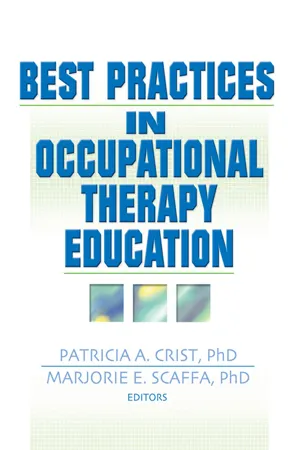
- 232 pages
- English
- ePUB (mobile friendly)
- Available on iOS & Android
Best Practices in Occupational Therapy Education
About This Book
Take your OT educational skills to the next level! Best Practices in Occupational Therapy Education is a must-have resource that showcases successful methods and practices in occupational therapy education. This unique book provides the information that can help you improve your skills to become an even more effective contemporary occupational therapy educator. Edited by Patricia Crist and Marjorie E. Scaffa, who previously collaborated on Education for Occupational Therapy in Health Care: Strategies for the New Millennium, Best Practices In Occupational Therapy Education highlights OT training methods proven effective by top OT educators. The book examines the effects of level II fieldwork on clinical reasoning in occupational therapy and on the professional development of fieldwork studentsin terms of occupational adaptation, clinical reasoning, and client-centeredness. It also shows how to promote professional reflection through problem-based learning evaluations and activities; how OT students' personality types affect the teaching and learning strategies that work best with them; and how to integrate evidence-based practice into students' academic and fieldwork experiences. This results-oriented text examines important concepts and approaches in teaching occupational therapy, such as:
- Web-based supports for occupational therapy students during level II fieldwork
- ways to facilitate creative thinking and memory, motivate students, and promote positive learning outcomes
- using evaluation activities in problem-based learning to help students develop professional reflection skills
- customizing your instructional delivery methods to the specific needs of your students
- balancing tradition with innovation
- education specifically aimed at community-based practice
- the benefits of online learning
- methods for developing cultural awareness, cultural sensitivity, and active listening skills
The teaching approaches in Best Practices in Occupational Therapy Education are clear and concrete, and include outcomes that support each thesis or learning objective. This analysis of best practices in occupation therapy education is an essential tool for educators that you'll refer to again and again.
Frequently asked questions
Index
Table of contents
- Cover Page
- Half Title page
- Title Page
- Copyright Page
- Contents
- About the Editors
- Message from the Editors
- Fieldwork Education
- Instructional Methods
- Focus on Student Professional Development
- Instructional Technology
- Preparation for Community-Based Practice
- Editors’ Invited Commentary on Professional Issues
- Index